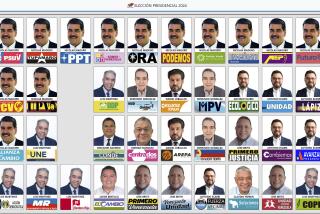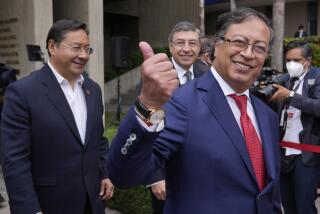People Take Stand--as Candidates
BOGOTA, Colombia — During two years of political crisis, Colombians have seen issue after issue--extradition, tougher prison terms for drug traffickers, the president’s impeachment proceedings--resolved in Congress. It has been an eye-opener.
“In the president’s trial, the country saw on live television how Congress works, how rotten it is,” said magazine columnist Maria Isabel Rueda, referring to aborted proceedings against Ernesto Samper in 1996. “People said, ‘Something has to be done.’ ”
What Colombians have done is to register, by the hundreds, as independent candidates in congressional elections March 8. A talk show host, a financial executive, a singer, a former military officer and a rock band manager are among the first-time candidates on the ballot.
“It’s time to do something concrete and participate actively,” said Claudia Vasquez, a former trust company executive who is one of the first-time candidates. After seeing a dozen members of Congress jailed in recent years for accepting drug money, many other Colombians feel the same way.
In Bogota alone, 176 candidates are running for 18 seats in the Chamber of Representatives.
Colombian congressional candidates run on tickets. The number of votes determines how many candidates from each ticket are elected. Senators are chosen nationally and deputies by region.
“This is a moment of transition in Colombia, when independents may be able to do well,” political analyst Andres Franco said. The urban middle class is fed up with the two traditional parties--the Liberals and the Conservatives--and is looking for an alternative that has not been tainted by the scandals of recent years, he said.
Still, independent candidates are coming up against an entrenched system of patronage politics and outright vote-buying run by two well-oiled political machines. Particularly in the countryside, where about one-third of the population lives, the idea of voting out of conviction is novel.
Novice candidates also complain about a newer development undermining democracy: Money from illegal drugs is flowing into political campaigns, just as it did four years ago, they said.
“You can see the drug money because it is not possible that all the money that is being spent could come from legitimate sources,” said columnist Rueda, who is running for the Chamber of Representatives. “Besides, we know that drug trafficking has not ended in Colombia.”
Still, the biggest enemy of the first-time candidates may be voter apathy. Abstention is traditionally high in Colombia’s congressional elections, and with the country disgusted by government, it could be even higher this year.
The theme of many novice campaigns is simply getting out the vote. “Not voting here represents helping and supporting the [political] machine,” Vasquez said.
Other candidates are emphasizing the importance of Congress in negotiating an end to the nearly 40-year civil war. “Unless the elections legitimize the government, [guerrillas are] going to be emboldened,” said Senate hopeful Carlos Velasquez, a former army colonel.
Velasquez said corruption has become so rampant that Congress may have to be shut down, as it was in Peru in 1992. “A corrupt Congress is a permanent obstacle to peace,” he warned.
Reformers admit that they will be lucky to get 30% of the total vote. Observers agree: The rascals are just too hard to throw out, they said.
“There may be surprises and changes, but the majority of those bandits will be voted back in, unfortunately,” newspaper columnist Enrique Santos Calderon said.
More to Read
Sign up for Essential California
The most important California stories and recommendations in your inbox every morning.
You may occasionally receive promotional content from the Los Angeles Times.










